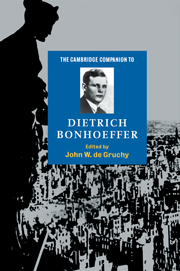Book contents
- Frontmatter
- Part one Bonhoeffer's Life and Legacy
- Part two Major themes in Bonhoeffer's theology
- 6 Human sociality and Christian community
- 7 'Who is Jesus Christ, for us, today?
- 8 Ecumenical witness for peace
- 9 Costly discipleship
- 10 Church, state and the 'Jewish question'
- 11 The ethics of responsible action
- 12 Christianity in a world come of age
- 13 Prayer and action for justice
- Select English bibliography
- Index
10 - Church, state and the 'Jewish question'
from Part two - Major themes in Bonhoeffer's theology
Published online by Cambridge University Press: 28 May 2006
- Frontmatter
- Part one Bonhoeffer's Life and Legacy
- Part two Major themes in Bonhoeffer's theology
- 6 Human sociality and Christian community
- 7 'Who is Jesus Christ, for us, today?
- 8 Ecumenical witness for peace
- 9 Costly discipleship
- 10 Church, state and the 'Jewish question'
- 11 The ethics of responsible action
- 12 Christianity in a world come of age
- 13 Prayer and action for justice
- Select English bibliography
- Index
Summary
The church is the church only when it is for others.
Civil courage, in fact, can grow only out of the free responsibility of free men . . . a person's inward liberation to live a responsible life before God is the only real cure for folly.
In these words of Dietrich Bonhoeffer we glimpse the creative centre of his paradigm for human behaviour within the church and the state. Through essays, letters and books he explored both traditional and experimental patterns of relating the church which he served to the state, especially the German state during the rule of Adolf Hitler and the Nazis (1933-45). Bonhoeffer's institutional vision, initially focused intellectually and geographically on central Europe, impelled him, particularly during his imprisonment (1943-45), into an expansive love for the world, 'the whole of human life in all its manifestations'.
The Canadian theologian Douglas John Hall discerns Bonhoeffer's 'theology of world-orientation' most vividly in the letters and papers penned in his Tegel prison cell. For Hall this Tegel theology constituted 'a fundamental break with the other-worldliness and world-ambiguity of conventional Christianity'. Yet, at the start of his career, Bonhoeffer had already displayed sensitivity towards the struggles of marginal groups in society (blacks in New York City and poor, troubled teenagers in Berlin), revealing his unwillingness to retreat from reality, even during the early 1930s. As soon as the Nazis began anti-Semitic persecution in April 1933, Bonhoeffer was one of the first Christian theologians to focus on the Jewish issue as central in the church struggle (Kirchenkampf), both within the German Evangelical (Protestant) Church itself and in its fight against Nazi control.
- Type
- Chapter
- Information
- The Cambridge Companion to Dietrich Bonhoeffer , pp. 190 - 205Publisher: Cambridge University PressPrint publication year: 1999
- 4
- Cited by

